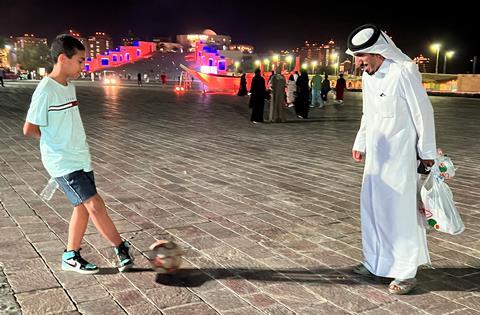The World Cup is a wake-up call that labour exploitation is still a very real problem for millions of people around the world, and unless we act now, it will continue to get worse. Here, Frances Kordonowy from modern slavery charity IJM, explains what churches can do to help.

Ever since Qatar was announced as the host of this year’s men’s football World Cup, our TV screens and news apps have been full of disturbing reports of workers facing abuse in the country. We’ve been shown vulnerable workers subjected to inhumane working conditions, including in the construction of World Cup venues. Many people working in Qatar are migrants from places like South Asia and the Philippines, who are at particular risk of abuse – often facing limited freedom to leave.
The World Cup is putting a global spotlight on labour exploitation, but what’s been reported in Qatar is just the tip of the iceberg. Forced labour is a problem all over the world, and it’s much closer to home than you might think, touching all our lives – including through the supply chains of the products we use every day. Did you know that 77 per cent of UK businesses still think there is a likelihood of slavery in their supply chains, according to the Ethical Trading Initiative? That means that everything from the clothes we wear to the smartphones we check the latest scores on could have been touched by forced labour.
There are an estimated 28 million people trapped in situations of forced labour around the world, according to the International Labour Organisation – 2.7 million more than in 2016. Many of them are women, and each of them has a story to tell. Women like Chandrabati, who became trapped in forced labour in a brick kiln in South Asia after accepting a job offer from the owner, which came with an advance on her wages. She needed the money to put her daughter through school, so it sounded like a good opportunity. But once she got there, the job turned out to be very different to what she had expected. She spent long days moulding and firing bricks in the punishing heat, with no water or pay, trapped by her debt. Even her five-year-old daughter was forced to work.
Churches have an opportunity to rally their local communities for watch parties, which act both as conversation-starters about exploitation, and as a chance to fundraise towards solutions.
Chandrabati said: “The owner’s men would constantly threaten that they would give us electric shocks and remove our skin if they see us not working, and we lived in constant fear.” She heard stories from other workers of a labourer who had died after being electrocuted, which was a frightening reminder that if the owner tried to hurt her, she didn’t have anyone to turn to for help. She was far from her community, in an unknown place, with no hope of escape.
Situations like Chandrabati’s are playing out across the world right now. With the World Cup reminding us of this brutal injustice, many churches will be wondering what they can do to help. In response, International Justice Mission UK (IJM), Tearfund and Compassion have teamed up to launch Justice United, an initiative which offers churches, football fans and gamers an opportunity during the World Cup to join the movement to end exploitation. Churches have an opportunity to rally their local communities for watch parties, FIFA gaming tournaments or other events, which act both as conversation-starters about exploitation, and as a chance to fundraise towards solutions.
When people in poverty are not protected through effective justice systems, traffickers can exploit their vulnerability.
One of the key drivers of exploitation is poverty. Just like Chandrabati, many people find themselves targeted by traffickers because financial challenges make them vulnerable to exploitative loans, or false offers of work. When people in poverty are not protected through effective justice systems, traffickers can exploit their vulnerability. That’s why tackling exploitation requires a holistic approach, addressing the root causes alongside the problem itself. For the first time in decades, extreme poverty is on the rise, making it particularly urgent to act now. IJM UK, Tearfund and Compassion are all helping stop exploitation, whether by bringing people trapped in slavery to safety and seeing traffickers held to account, or empowering communities to lift themselves out of poverty and helping families through the global food crisis so that they are less vulnerable to traffickers in the first place.
Ultimately, Chandrabati’s story shows that there is hope. With IJM’s support, authorities found her and her children and brought 61 people to safety from the brick kiln, arresting the kiln owner and two of his associates. IJM was also able to support Chandrabati’s family with housing, education and opportunities for her daughters, so they could rebuild their lives in safety and look forward to a positive future.
The World Cup is a wake-up call that labour exploitation is still a very real problem for millions of people around the world, and unless we act now, it will continue to get worse. It will take a movement to end poverty and exploitation. Right now churches have the opportunity be part of this movement – bringing their communities together to enjoy football, whilst starting crucial conversations about injustice and inspiring positive change. Together, we can create a future where nobody is exploited.































No comments yet